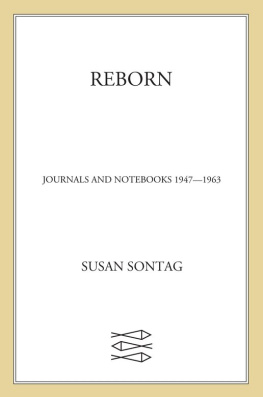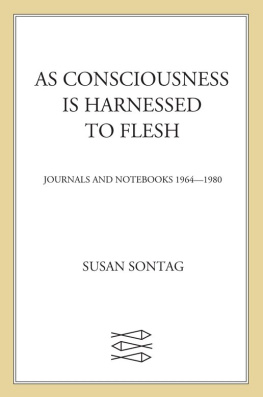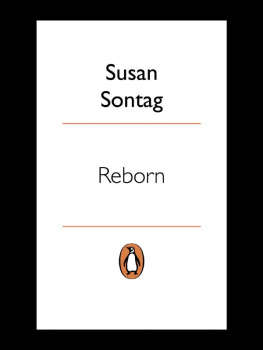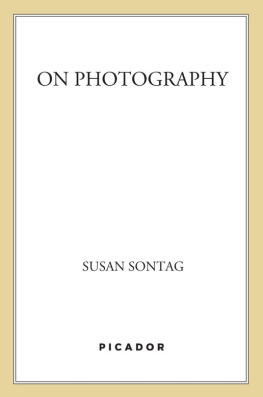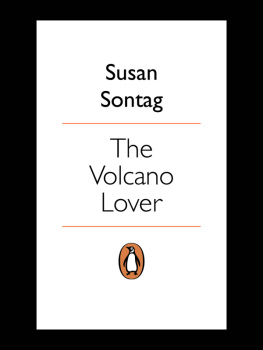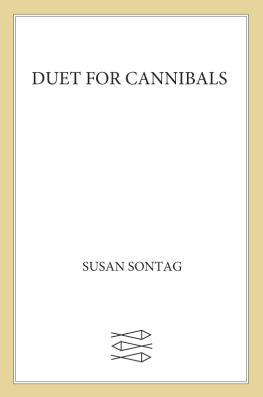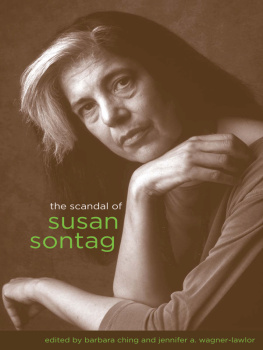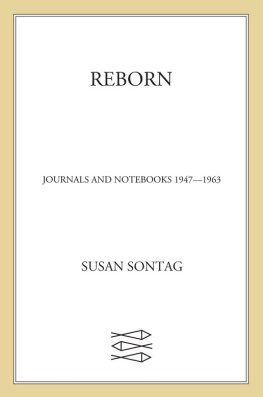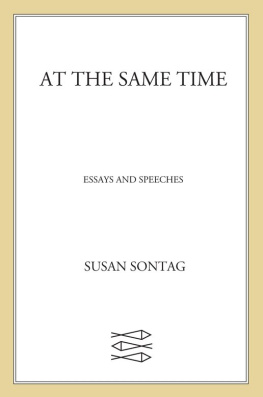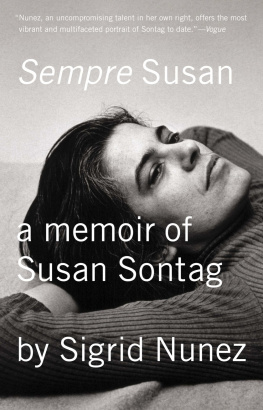Susan Sontag - Under the Sign of Saturn: Essays
Here you can read online Susan Sontag - Under the Sign of Saturn: Essays full text of the book (entire story) in english for free. Download pdf and epub, get meaning, cover and reviews about this ebook. year: 2002, publisher: Picador, genre: Science. Description of the work, (preface) as well as reviews are available. Best literature library LitArk.com created for fans of good reading and offers a wide selection of genres:
Romance novel
Science fiction
Adventure
Detective
Science
History
Home and family
Prose
Art
Politics
Computer
Non-fiction
Religion
Business
Children
Humor
Choose a favorite category and find really read worthwhile books. Enjoy immersion in the world of imagination, feel the emotions of the characters or learn something new for yourself, make an fascinating discovery.

- Book:Under the Sign of Saturn: Essays
- Author:
- Publisher:Picador
- Genre:
- Year:2002
- Rating:3 / 5
- Favourites:Add to favourites
- Your mark:
- 60
- 1
- 2
- 3
- 4
- 5
Under the Sign of Saturn: Essays: summary, description and annotation
We offer to read an annotation, description, summary or preface (depends on what the author of the book "Under the Sign of Saturn: Essays" wrote himself). If you haven't found the necessary information about the book — write in the comments, we will try to find it.
This third essay collection by Americas leading essayist brings together her most important critical writing from 1972 to 1980, in which she explores some of the most influential artists and thinkers of our time.
Under the Sign of Saturn: Essays — read online for free the complete book (whole text) full work
Below is the text of the book, divided by pages. System saving the place of the last page read, allows you to conveniently read the book "Under the Sign of Saturn: Essays" online for free, without having to search again every time where you left off. Put a bookmark, and you can go to the page where you finished reading at any time.
Font size:
Interval:
Bookmark:
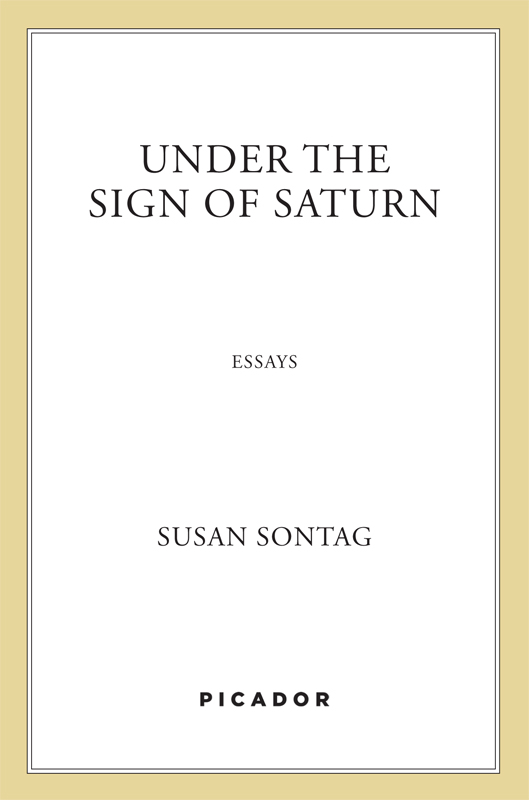

The author and publisher have provided this e-book to you for your personal use only. You may not make this e-book publicly available in any way. Copyright infringement is against the law. If you believe the copy of this e-book you are reading infringes on the authors copyright, please notify the publisher at: us.macmillanusa.com/piracy.
Contents
FOR JOSEPH BRODSKY
Hamm: I love the old questions.
(With fervour.)
Ah the old questions, the old answers,
theres nothing like them!
Endgame
On Paul Goodman
I am writing this in a tiny room in Paris, sitting on a wicker chair at a typing table in front of a window which looks onto a garden; at my back is a cot and a night table; on the floor and under the table are manuscripts, notebooks, and two or three paperback books. That I have been living and working for more than a year in such small bare quarters, though not at the beginning planned or thought out, undoubtedly answers to some need to strip down, to close off for a while, to make a new start with as little as possible to fall back on. In this Paris in which I live now, which has as little to do with the Paris of today as the Paris of today has to do with the great Paris, capital of the nineteenth century and seedbed of art and ideas until the late 1960s, America is the closest of all the faraway places. Even during periods when I dont go out at alland in the last months there have been many blessed days and nights when I have no desire to leave the typewriter except to sleepeach morning someone brings me the Paris Herald Tribune with its monstrous collage of news of America, encapsulated, distorted, stranger than ever from this distance: the B-52s raining ecodeath on Vietnam, the repulsive martyrdom of Thomas Eagleton, the paranoia of Bobby Fischer, the irresistible ascension of Woody Allen, excerpts from the diary of Arthur Bremerand, last week, the death of Paul Goodman.
* * *
I find that I cant write just his first name. Of course, we called each other Paul and Susan whenever we met, but both in my head and in conversation with other people he was never Paul or ever Goodman but always Paul Goodmanthe whole name, with all the ambiguity of feeling and familiarity which that usage implies.
The grief I feel at Paul Goodmans death is sharper because we were not friends, though we co-inhabited several of the same worlds. We first met eighteen years ago. I was twenty-one, a graduate student at Harvard, dreaming of living in New York, and on a weekend trip to the city someone I knew who was a friend of his brought me to the loft on Twenty-third Street where Paul Goodman and his wife were celebrating his birthday. He was drunk, he boasted raucously to everyone about his sexual exploits, he talked to me just long enough to be mildly rude. The second time we met was four years later at a party on Riverside Drive, where he seemed more subdued but just as cold and self-absorbed.
In 1959 I moved to New York, and from then on through the late 1960s we met often, though always in publicat parties given by mutual friends, at panel discussions and Vietnam teach-ins, on marches, in demonstrations. I usually made a shy effort to talk to him each time we met, hoping to be able to tell him, directly or indirectly, how much his books mattered to me and how much I had learned from him. Each time he rebuffed me and I retreated. I was told by mutual friends that he didnt really like women as peoplethough he made an exception for a few particular women, of course. I resisted that hypothesis as long as I could (it seemed to me cheap), then finally gave in. After all, I had sensed just that in his writings: for instance, the major defect of Growing Up Absurd, which purports to treat the problems of American youth, is that it talks about youth as if it consists only of adolescent boys and young men. My attitude when we met ceased being open.
Last year another mutual friend, Ivan Illich, invited me to Cuernavaca at the same time that Paul Goodman was there giving a seminar, and I told Ivan that I preferred to come after Paul Goodman had left. Ivan knew, through many conversations, how much I admired Paul Goodmans work. But the intense pleasure I felt each time at the thought that he was alive and well and writing in the United States of America made an ordeal out of every situation in which I actually found myself in the same room with him and sensed my inability to make the slightest contact with him. In that quite literal sense, then, not only were Paul Goodman and I not friends, but I disliked himthe reason being, as I often explained plaintively during his lifetime, that I felt he didnt like me. How pathetic and merely formal that dislike was I always knew. It is not Paul Goodmans death that has suddenly brought this home to me.
He had been a hero of mine for so long that I was not in the least surprised when he became famous and always a little surprised that people seemed to take him for granted. The first book of his I ever readI was seventeenwas a collection of stories called The Break-up of Our Camp, published by New Directions. Within a year I had read everything hed published, and from then on started keeping up. There is no living American writer for whom I have felt the same simple curiosity to read as quickly as possible anything he wrote, on any subject. That I mostly agreed with what he thought was not the main reason; there are other writers I agree with to whom I am not so loyal. It was that voice of his that seduced methat direct, cranky, egotistical, generous American voice. If Norman Mailer is the most brilliant writer of his generation, it is surely by reason of the authority and eccentricity of his voice; and yet I for one have always found that voice too baroque, somehow fabricated. I admire Mailer as a writer, but I dont really believe in his voice. Paul Goodmans voice is the real thing. There has not been such a convincing, genuine, singular voice in our language since D. H. Lawrence. Paul Goodmans voice touched everything he wrote about with intensity, interest, and his own terribly appealing sureness and awkwardness. What he wrote was a nervy mixture of syntactical stiffness and verbal felicity; he was capable of writing sentences of a wonderful purity of style and vivacity of language, and also capable of writing so sloppily and clumsily that one imagined he must be doing it on purpose. But it never mattered. It was his voice, that is to say, his intelligence and the poetry of his intelligence incarnated, which kept me a loyal and passionate addict. Though he was not often graceful as a writer, his writing and his mind were touched with grace.
* * *
There is a terrible, mean American resentment toward a writer who tries to do many things. The fact that Paul Goodman wrote poetry and plays and novels as well as social criticism, that he wrote books on intellectual specialties guarded by academic and professional dragons, such as city planning, education, literary criticism, psychiatry, was held against him. His being an academic freeloader and an outlaw psychiatrist, while also being so smart about universities and human nature, outraged many people. That ingratitude is and always was astonishing to me. I know that Paul Goodman often complained of it. Perhaps the most poignant expression was in the journal he kept between 1955 and 1960, published as Five Years, in which he laments the fact that he is not famous, not recognized and rewarded for what he is.
That journal was written at the end of his long obscurity, for with the publication of Growing Up Absurd in 1960 he did become famous, and from then on his books had a wide circulation and, one imagines, were even widely readif the extent to which Paul Goodmans ideas were repeated (without his being given credit) is any proof of being widely read. From 1960 on, he started making money as he was taken more seriouslyand he was listened to by the young. All that seems to have pleased him, though he still complained that he was not famous enough, not read enough, not appreciated enough.
Font size:
Interval:
Bookmark:
Similar books «Under the Sign of Saturn: Essays»
Look at similar books to Under the Sign of Saturn: Essays. We have selected literature similar in name and meaning in the hope of providing readers with more options to find new, interesting, not yet read works.
Discussion, reviews of the book Under the Sign of Saturn: Essays and just readers' own opinions. Leave your comments, write what you think about the work, its meaning or the main characters. Specify what exactly you liked and what you didn't like, and why you think so.

